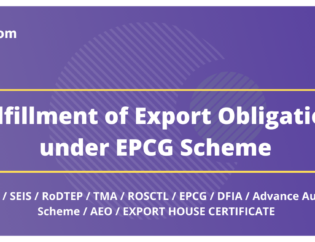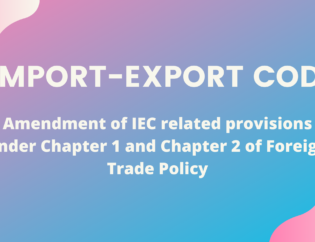
Various schemes have been implemented for the promotion of exports from India. The objective of these schemes is to provide benefits to the exporters to compensate infrastructural inefficiencies and to provide exporters with a fair and equal platform. The Export Oriented Unit (EOU) Scheme is an example of such export promoting schemes.
GST, since its inception, has impacted all the existing export-promoting policies and schemes. In this article, we will take an overview of the GST impact on EOU schemes
Before that, let us first understand what exactly EOU means.
[To know about Advance Payment under GST you can read our article on Is Tax to be paid on Advance Payment Received under GST? ]
Contents
Introduction
Chapter 6 of the Foreign Trade Policy mentions the scheme related to the export-oriented unit i.e. EOUs. The objective of creating this scheme is to stimulate exports and earn foreign exchange for the country, attract investment for export production, giving an opportunity to the units to freely choose the location of a project and generation of additional employment. These units are treated in a way different from the units established in DTA (Domestic Tariff Area) for taxation purposes. These units are allowed to bring in capital goods and raw materials without payment of duties/taxes and use them to manufacture export goods. In this manner, the export goods don’t have to suffer multiple domestic duties that may or may not get refunded upon exports.
Permission/Application
Permissions for EOUs are given by The Development Commissioner (DC) of EOUs of any particular area where the manufacturing unit is to be located.
One needs to make an application to the Units Approval Committee presided over by the DC which would give approval for the setting of the EOU unit that administers the scheme.
Specific Rules and Conditions applicable
- Net Foreign Exchange (NFE) Earnings: EOU’s shall be a positive net foreign exchange earner. NFE Earnings will be calculated on the cumulative basis in the block of 5 years, beginning from the inception of production.
- Letter of Permission (LoP)/Letter of Intent (LoI): LoP/LoI will be issued by the DC which has a validity of 2 years, and then it can be further extended by DC and/or Unit Approval Committee.
- Minimum Investment: Establishment as EOUs will be possible only if the project has a minimum of Rs.1 crore investments in plant and machinery.
- DTA sale of finished goods: EOUs can sell up to 50% of FOB value of exports in DTA (Domestic Tariff Area) with the payment of applicable GST on Export.
- Accounts: Proper accounting is to be done for imports, consumption, and utilization of all imported materials. Separate accounts to be maintained for exports and DTA supplies.
GST Applicability
Under GST Law, there are no special provisions made for EOUs. EOUs are considered as any other normal registered person under GST and all the provisions of the Act and rules are applicable to EOUs. Let us understand the GST impact on supply transactions to and from EOUs.
Supply from Any Registered Person to EOUs
As per Notification No. 48/2017-Central Tax, the Central Government has notified the supply of goods by a registered person to Export Oriented Units (EOUs) as ‘Deemed Exports’. It is important to note that deemed exports covers only the supply of goods and not the supply of services. Thus, a supply of services from any registered person to an EOU is not deemed export.
Deemed exports are different from the regular exports. The supply can be made only through the payment of taxes and not under any Bond or Letter of Undertaking. The refund procedure is, however similar for both kinds of exports.
The refund under deemed exports can be claimed either by the Supplier (any registered party) or the Recipient (EOU). So if the supplier is claiming the refund of the IGST on such deemed exports then the recipient could not claim the credit of IGST paid to supplier nor can claim the refund of the same.
Supply from EOUs
One may supply a certain percentage of produce from EOUs in DTA unit (Domestic Tariff Area) after paying applicable GST Liability. However, as the primary purpose of setting up such units is to promote exports, a major part of the product will be exported.
When the EOUs export the goods or services, the normal provisions of exports (zero-rated supply) is applicable to it. Either it can export under the Bond or Letter of Undertaking or by paying applicable IGST liability. When the export is made by way of payment of GST liability, then the EOUs can claim the refund of such tax paid.
[To know more about GST, refer to our article on Advantages and Disadvantages of GST]
Conclusion
If we take the overview of the GST applicability on the EOUs, we can pretty well conclude that EOUs have the same status as that of any other normal registered person under GST.
Though benefits are given to the supplier supplying goods to EOUs and also EOUs (as the recipient of goods) in the form of deemed exports, the overall impact of EOUs under GST is not much beneficial.
If you require more information or have any queries, Please fill below form to get in touch with us.








































